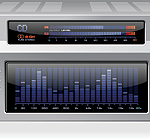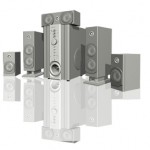Which Surround-Sound Format?
Which Surround-sound Format?
In the last section, we saw that audio/video receivers decode the surround sound information encoded in video signals and drive the appropriate speakers. Different audio/video receivers are equipped to decode different formats. Today, there are two main sources for home theater surround-sound formats — Dolby Laboratories and Digital Theater Systems. Dolby Laboratories formats include various versions of Dolby Digital® and Dolby Pro Logic®. Digital Theater Systems has created a range of DTS Digital Theater Sound formats.
Between the two companies, there is a dizzying array of sound options. So here’s what you need to know:
Read the rest of this entry »
The Reciever

The audio/video (a/v) receiver and amplifier assembly in a home theater does the same job as the receiver and amplifier assembly in any stereo system: It receives signals from various input devices, like a VCR, DVD player or satellite dish. It interprets and amplifies those signals and then sends them to output devices — your television and sound system.
Read the rest of this entry »
Surround Sound Basics

The main thing that sets a home theater apart from an ordinary television setup is the surround sound. For a proper surround-sound system, you need two to three speakers in front of you and two to three speakers to your sides or behind you. The audio signal is split into multiple channels so that different sound information comes out of the various speakers.
Read the rest of this entry »

